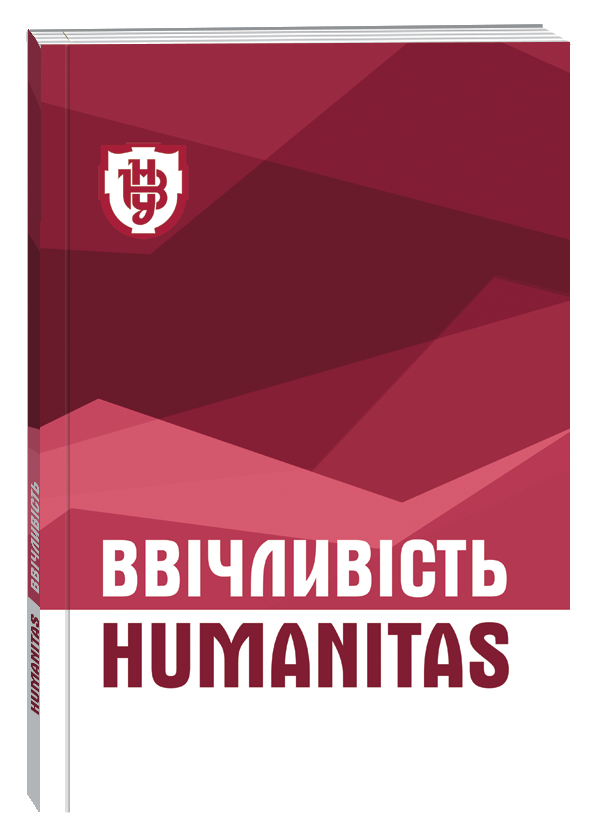ОСОБЛИВОСТІ ФОРМУВАННЯ ЕМОЦІЙНО-ВОЛЬОВОЇ СТІЙКОСТІ У МАЙБУТНІХ ОФІЦЕРІВ ЯК ОСНОВИ ЇХ ПРОФЕСІОНАЛІЗМУ
DOI:
https://doi.org/10.32782/humanitas/2024.3.15Ключові слова:
професіоналізм, професійна компетентність, професійна підготовка, емоційно-вольова стійкість, майбутні офіцериАнотація
У статті розглянуто проблему формування емоційно-вольової стійкості в майбутніх офіцерів. Розкрито сутність поняття «емоційно-вольова стійкість офіцера» як його здатності швидко орієнтуватися в умовах постійних змін обставин професійної діяльності, знаходити оптимальне рішення у складних нестандартних ситуаціях і зберігати при цьому витримку та самоконтроль. Обґрунтовано роль емоційно-вольової стійкості у майбутній професійній діяльності офіцера, перелічено її основні складові. Вказано, що емоційно-вольова стійкість військовослужбовця є основою його професіоналізму та професійної компетентності, а, отже, від рівня її сформованості значною мірою залежить не лише результативність діяльності ввіреного офіцеру військового підрозділу, ефективність його керівництва цим формуванням, а, в умовах повномасштабної російської агресії в Україні – й збереження життя та здоров’я особового складу. Зазначено, що недостатній рівень емоційно-вольової стійкості майбутнього офіцера супроводжується суттєвими психоемоційними навантаженнями, що, як правило, призводить до прийняття ним помилкових рішень, а у крайніх випадках – паніки, неякісної реалізації завдань. Увагу приділено теоретичним і практичним засадам означеного процесу. Обґрунтовано ідею про те, що формування емоційно-вольової стійкості у майбутніх офіцерів має проводитися під керівництвом психолога/ соціального педагога закладу вищої військової освіти як в ході їх професійної підготовки, так і у процесі саморозвитку й у вільний від служби/навчання час. Автором запропоновано рекомендації щодо формування емоційновольової стійкості у майбутніх офіцерів. Зазначено, що перспективним напрямом подальших досліджень в означеній сфері є вивчення закордонного досвіду професійної підготовки майбутніх офіцерів у цілому та формування їх емоційно-вольової стійкості зокрема.
Посилання
Артюшин Г. М. Актуальні проблеми вищої професійної підготовки військових кадрів. Військова освіта : збірник наукових праць. Київ : ГУКП НМЦВО МОУ. 2001. № 9. С. 123–128.
Брижатий Є.І. Військова освіта в контексті національної безпеки та оборони: сучасний підхід. Збірник наукових праць «Військова освіта». К.: № 1 (42). НУОУ. 2020. C. 35–45.
Брижатий Є. І. Військово-професійна підготовка майбутніх офіцерів: від готовності до професіоналізму. Вісник Національного університету оборони України. 2014. № 6. С. 13–17.
Васильєв О. М. Сучасні тенденції управління змінами в системі вищої військової освіти. Збірник наукових праць «Військова освіта». К.: № 2 (42), НУОУ, 2020. C. 27–38.
Дзвоник Г. П. Роль емоційної стійкості в професійному самоздійсненні фахівця. Актуальні проблеми психології. Інститут психології імені Г.С. Костюка НАПН України. 2016. Том. V. С. 24–29.
Колосович О. С. Психологічні аспекти професійної діяльності молодих офіцерів. Науковий вісник Львівського державного університету внутрішніх справ. 2013. Вип. 2. С. 277–285.
Костів С. Емоційно-вольова стійкість військових фахівців. Військова освіта. 2017. № 2. С.107–116.
Нещадим М. І. Військова освіта України: історія, теорія, методологія, практика : монографія. Київ: Видавничо-поліграфічний центр «Київський університет», 2003. 852 с.
Пилипенко К. В. Емоційна стійкість як професійно важлива якість майбутнього психолога-практика // Практична психологія в системі вищої освіти: теорія, результати досліджень, технології : колективна монографія / ред. проф. Н. І. Пов’якель. К. : НПУ імені М. П. Драгоманова, 2009. С. 137–147.
Стандарт вищої освіти України: перший (бакалаврський) рівень, галузь знань 25 – Воєнні науки, національна безпека, безпека державного кордону, спеціальність 253 – Військове управління (за видами збройних сил). URL: https://mon.gov.ua/storage/app/media/vishcha-osvita/2022/Standarty. Vyshchoyi.Osvity/Zatverdzheni.Standarty/01/31/253-Viysk.upr-bak.31.01.22.pdf
Цевельов О. Є. Міжнародне безпекове середовище: вплив на формування політики професійної військової освіти в Україні. Збірник наукових праць «Військова освіта». К.: НУОУ, 2021, № 1 (43). C. 322–338.







